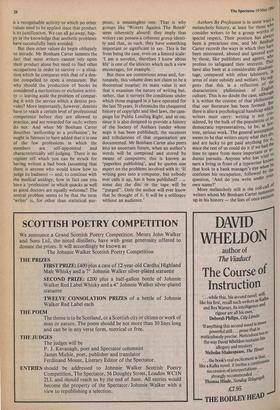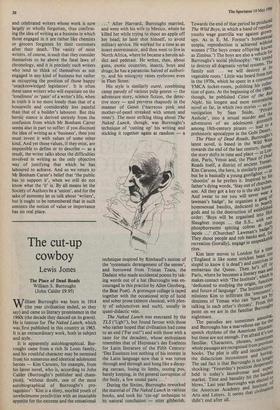Lucky to get paid
Peter Ackroyd
Authors by Profession Victor Bonham Carter (The Godley Head £12.50)
This is a history of 'the business of writing in Britain', and as such can be recommended to those who enter that un- fortunate trade; it is, at least in part, a com- pendium of all those matters with which writers are preoccupied — subsidiary rights, contracts, royalties and the amount of money which various types of work com- mand. It is interesting to note, for example, that in 1982 (when the book was written) the minimum rate for a 60-minute television play was £3,800 and that a film-script will earn its author approximately £25,000. How pleasant to know that in 1967 the Spectator offered its contributors 16 guineas per 1000 words (on that basis, the current rate must be £134.50) and was a substantially higher payer than most of its rivals; no doubt the tradition continues. And it is depressing (I suppose) to be told that only six per cent of writers regard the composition of books as their principal oc- cupation. And so as a financial and statistical survey, the literary equivalent of Jane's Fighting Ships, this is an enterprising and sometimes illuminating work.
At some point, however, Victor Bonham Carter forgets that he is writing about `business' and discusses the situation of contemporary 'literature' — a situation ap- parently so parlous that 'the public has to support it', not by reading it but by sub- sidising it. The use of 'has' here suggests a moral obligation, but it is one which the no- tion of writing as a 'business' seems ill- equipped to justify. There is in any event an abyss between these two conceptions over which we need to be led gently; Mr Bonham Carter might have done so by relating writing to other reputable small businesses (the making of bicycles, for example) which are supposed to need public subsidies in order to survive. But, perhaps sensing the dangers ahead, he has chosen not to do so.
The absence of such arguments does lead to a certain amount of confusion, however. Mr Bonham Carter employs the terms 'author' and 'writer', but what exactly is a 'writer'? Since journalism is treated here as a separate activity, let us assume that a 'writer' is defined by the production of books. But what kind of books? Is the author of a cookery book, or a text-book on applied mechanics, a 'writer' and thus part of Mr Bonham Carter's history? It would seem so, and in fact there is no reason why not, since on these terms we have the makings of a perfectly coherent definition: writers form a distinct group on the basis of their product, and writing itself is a recognisable activity to which no other values need to be applied since that product is its justification. We can all go away, hap- py in the knowledge that aesthetic problems have successfully been avoided.
But then other values do begin obliquely to intrude. Mr Bonham Carter laments the fact that most writers cannot rely upon their product alone but need to find other occupations in order to survive — a situa- tion which he compares with that of a den- tist compelled to open a restaurant. But why should the production of books be considered a meritorious or exclusive activi- ty — leaving aside the problem of compar- ing it with the service which a dentist pro- vides? More importantly, however, dentists have to reach a certain level of professional competence before they are allowed to practice, and are rewarded for such; writers do not. And when Mr Bonham Carter describes 'authorship as a profession', he ought in fairness to have added that it is one of the few professions in which the members are self-appointed and characteristically self-judging. There is no register off which you can be struck for having written a bad book (assuming that there is anyone who would know how to judge its badness) — and, to continue with the medical analogy, how in fact can you have a 'profession' in which quacks as well as good doctors are equally welcome? The central problem seems to be that the term `writer' is, for other than statistical pur-
poses, a meaningless one. That is why groups like 'Writers Against The Bomb' seem inherently absurd: they imply that writers can possess a coherent group identi- ty and that, as such, they have something important or significant to say. This is far from being the case, even on a limited scale: `I am a novelist, therefore I know about life' is one of the idiocies which such a view encourages, for example.
But these are contentious areas and, for- tunately, this volume does not claim to be a theoretical treatise; its main value is not that it examines the nature of writing but, rather, that it surveys the conditions under which those engaged in it have operated for the last 70 years. It chronicles the chequered history of copyright and libel laws, the cam- paign for Public Lending Right, and so on; since it is also designed to provide a history of the Society of Authors (under whose aegis it has been published), the successes and tribulations of that organisation are documented. Mr Bonham Carter also peers into an uncertain future, when an author's words will be composed and stored by means of computers; this is known as 'paperless publishing', and he quotes one expert on the problems involved with it: 'If writing goes into a computer, but nobody ever calls it up, has it been published? . — some day the disc or the tape will be "purged". Only the author will ever know that he thought of it. It will be a soliloquy without an audience.'
Authors By Profession is in some ways a melancholy history, at least for those who consider writers to be a group worthy f special respect. Their position has alvaYs been a precarious one, and Mr Bonham Carter records the ways in which they have been mistreated, abused and ignored even by those, like publishers and agents, who profess to safeguard their interests. They have also been at a considerable disadvan" tage, compared with other labourers, in areas of state subsidy and welfare. He s1.1,.g- gests that this is a reflection of e characteristic philistinism of Engliwsh, culture. This is no doubt the case, althoug" it is within the context of that philistillisult that our literature has been formed, 131 there is also a psychological handicap writers must carry: writing is not co.n: sidered, by the bulk of the population or its democratic representatives, to be, at bot- tom, serious work. The general assumPtifr; seems to be that writers enjoy what theY and are lucky to get paid anything for ite since the rest of us could do it if we had t" time to spare from more important or to duous pursuits. Anyone who has tried ors earn a living in front of a typewriter kOhe that look in a bank manager's eye when confesses his occupation, followed by ,he
own name?' do you write under You
w More melancholy still is the roll-call of_ writers whom Mr Bonham Carter sumro°!s up in his history — the lists of once eminent
and celebrated writers whose work is now largely or wholly forgotten, thus confirm- ing the idea of writing as a business in which those engaged in it are rather like chemists or grocers forgotten by their customers after their death. The vanity of most writers, of course, is such that they consider themselves to be above the fatal laws of chronology, and it is precisely such writers who tend to think of themselves as not engaged in any kind of business but rather as occupying the position of those happy `unacknowledged legislators'. It is often these same writers who will expatiate on the `loneliness' or 'pain' of a writer's life, when in truth it is no more lonely than that of a housewife and considerably less painful than that of a builder's labourer. But this heroic stance is derived entirely from the confusion from which Mr Bonham Carter seems also in part to suffer: if you discount the idea of writing as a 'business', then you must invest it with values of some other kind. And yet those values, if they exist, are impossible to define or to describe — as a result, the writer talks about the difficulties involved in writing as the only objective way of justifying that which he has laboured to achieve. And so we return to Mr Bonham Carter's belief that 'the public has to support it', when we still do not know what the 'it' is. By all means let the Society of Authors be a 'union', and for the sake of economy let us talk about 'writers', but it ought to be remembered that in such contexts the notion of value or importance has no real place.
















































 Previous page
Previous page